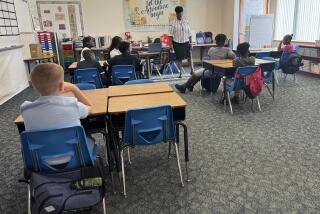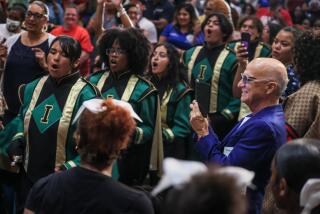Lynwood Opens Its $98-Million High School to Rave Reviews
For Lynwood High students like Dwayne Winston, overcrowded campuses with graffiti-stained walls had become as much a part of school life as homeroom and the prom.
But all that changed Tuesday, when he and about 4,000 other students poured into Californiaâs most expensive public school.
âItâs amazing,â Winston said of the new $98-million facility. âIt looks like a great big castle.â
The rosy-hued stone pillars and formidable walls of the new school provided a stark contrast to the peeling walls at the old high school campus, which has been converted into a middle school.
At the old school, students play in a gymnasium built in the late-1940s. Clumps of paint still dangle from shower room ceilings; locker doors have been torn from their hinges. At the new site Tuesday, students caught their first glimpse of a gym twice the size of the old one, with wall-to-wall tiled shower rooms.
The old campus relies on 45 trailers to ease burgeoning enrollment, and its computers lack Internet access. The new one boasts what officials from the Lynwood Unified School District called âstate of the art facilitiesâ: a mock-trial room organized like a real courtroom, closed-circuit televisions in each room, computer rooms hooked to the Internet via fiber-optic cables, a home economics room equipped with six new stoves and three new dishwashers.
âIâd planned to retire next year because Iâll be 65, but now Iâm going to stay,â said Clarice Chatmon, a home economics teacher, as she proudly scanned her new appliances. âTheyâre going to have to push me out.â
The first day of school at the state-funded campus capped more than 15 years of planning and lobbying by parents, teachers and administrators of the Lynwood district.
Early proposals estimated that the school would cost about $34 million, said board member Errick Lee. But after a long and bitter fight over one parcel of land, the siteâs cost alone reached $37 million.
School district and state education officials said the school may be one of the last to be totally funded by the state. State allocators now give priority to proposals from districts that promise to pay 50% of the costs, an official said.
At the old high school, students from Hosler Junior High filed into their new school. Though maintenance crews spent August furiously repairing and cleaning, conditions at the old campus infuriated middle school teachers. While Chatmon was admiring her new kitchen, home economics teacher Debera Armbruster a mile down the road railed against her facilities.
In one corner sat the roomâs sole stove, with only two of its burners usable. On the counter opposite lay a single microwave oven--made in 1979, Armbruster said. The classroom had no refrigerators.
âThis is supposedly storage space,â Armbruster said as she pointed at dirty wooden shelves. Floor tiles had corroded. In an adjoining room, ceiling tiles had fallen off. âWould you store food here? Itâs disgusting.â
In a trailer on the other side of campus, a sweating Karen Charpie-Elton complained that her aging air-conditioner had broken down and that the school was not yet ready for children.
âThis place is filthy,â Charpie-Elton said as her students sweltered behind her. âWe should call OSHA.â
District and school officials said the problems at the old high school stem in part from lack of funding, aging buildings and the burdens of year-round schooling.
Seven years ago, faced with crammed classrooms and increasing enrollment, the district kept schools open all year. With schools in session all the time, maintenance crews had few opportunities to make vitally needed repairs, Lee said.
That will change, he said. The district is returning to the traditional academic year and pushing ahead with plans to open another school next year and refurbish existing ones.
More to Read
Sign up for Essential California
The most important California stories and recommendations in your inbox every morning.
You may occasionally receive promotional content from the Los Angeles Times.











